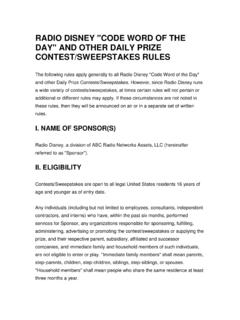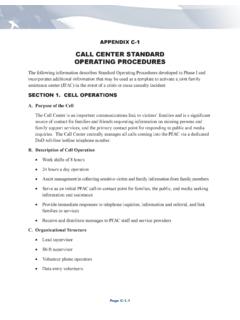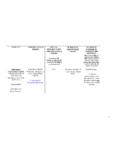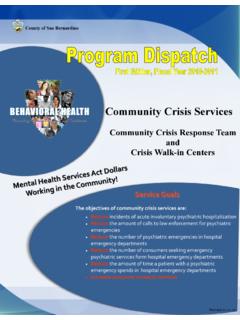Transcription of Stress and the 911 Dispatcher - Anne Arundel …
1 The 911 Dispatcher is the first "First Responder." The Dispatcher is the vital link, ensuring clear communication between all responders, affecting the safety of both the citizen in need and the police, fire and emergency medical personnel responding. Through our actions, we help save lives, protect property, and assist the public in their time of need. In this blog, I will share articles and other things of interest that may help dispatchers do their job more effectively. Stress and the 911 Dispatcher Taken from Emergency Number Professional Magazine, August 2009 Written by Kim Rigden, principal consultent of KRB Consulting of Waterloo, ON, teaching 911 dispatchers and training internationally on customer service, managing 911 callers and Dispatcher Stress . She has been in Emergency Medical Services for 18 years. She worked in the field as a Paramedic and Paramedic Instructor, Emergency Medical Dispatcher and EMD Trainer, and Communication Supervisor.
2 She now provides consulting services to communication centers in the areas of quality assurance, customer service and Stress -reduction, as well as teaches and consults for Priority Dispatch Corp. and the National Academies of Emergency Dispatch Help Wanted: 911 Dispatcher . Applicants must be easily irritated by 911 callers; phone slamming and swearing an asset. Preference will be given to candidates able to complain about their workload while receiving calls. Must be able to survive on donuts for breakfast, greasy takeout food in the wee hours and gallons of coffee. Punctuality and good attendance are not required, but working overtime is essential. The successful candidate should expect to be bullied by annoying senior co-workers. Remuneration: not nearly enough to put up with all this. No one would answer this job posting. People are attracted to 911 dispatching to help people, to be part of the exciting world of the emergency services, to make a difference.
3 Yet, if you have every worked in a 911 communications center, you will have witnessed some of these behaviors in other 911 dispatchers and possibly even in yourself. So what happens to change an empathetic, hardworking 911 Dispatcher into the person described above? Stress ! Stress is an epidemic in our 911 centers. Not the garden-variety Stress of life (though it can be tossed in for good measure), but the Stress associated with listening to someone else's worst day - every day - as a routine part of the job. This is the kind of Stress that builds up over time (cumulative Stress ), and slowly erodes our ability to feel empathy (compassion fatigue). It is the Stress that drops in like a sledgehammer when you hear the voice of a frantic mother screaming into the phone that she has found her son hanging in the garage (critical incident Stress ).
4 As Stress increases, the 911 Dispatcher puts up barriers in an effort to protect himself from the "cost of caring." The frustrations of call taking become the caller's fault (they are "stupid," they "don't know what a real emergency is," they are "rude") or the co-workers's fault ("they don't pick up their share of the 911 lines," "the lights are too bright in the dispatch center") or the boss's fault ("what does he know about this job? He never even comes in the room!"). 911 dispatchers carry a heavy load. They must be ready to answer any call, to help unappreciative callers, or callers who abuse the system. But without recognizing the symptoms of Stress and focusing on self-care, a good 911 Dispatcher can become frustrated, irritated and stressed-out. He no longer enjoys his job and he is not very effective as an emergency 911 Dispatcher .
5 More and more 911 tapes are being released to the media. How many of them have recently featured a rude Dispatcher ? How much would you like to bet that the rude Dispatcher is always a stressed-out Dispatcher ? How Does This Happen? What is Stress Anyway? Stress is insidious and can sneak up on the best of us without our realizing it. Not surprisingly, there are many forms of Stress ; everyone is affected by it and deals with it differently. All people experience Stress in one form or another. There is the Stress that is a normal and healthy part of life and then there is Stress that is destructive to mental and physical health. A great deal of Stress reduction is being able to identify the signs and symptoms of Stress in your life and to take action to reduce that Stress and minimize its effect on your body. Picture a tall water glass. Into this glass goes all of the drops of Stress we encounter every day - some big drops, some little drops.
6 On a day when we encounter normal amounts of Stress , this glass never gets full, yet if we experience increased Stress in our personal lives and we have a high- Stress job, the glass gets fuller. If Stress -inducing events are not recognized and dealth with, the negative effects of Stress spill out all over our lives in the form of physical and mental ailments. General Stress is the normal Stress of daily life. It is a state of physical and mental arousal, a demand for action. It is a necessary part of life. We would die if we didn't have some Stress in our life. Stress helps us make choices; it helps us get out and do the things we need to do; it can help us develop plans, change behaviors and begin new activities. Stress is a routine and normal part of our day. Stress is good when it is controlled. People deal with it, they learn from it, they recover from it and they may actually grow from it.
7 Stress Types Compassion Stress Those in the emergency services deal with compassion Stress which is the natural behavioral and emotional response of wanting to help people. This is why a lot of 911 dispatchers choose the jobs they do. It feels good to help people. As members of a helping profession that is faced with the suffering of others, 911 dispatchers empathize with the people they are assisting. They are subject to compassion Stress , but in return, they receive compassion satisfaction from their actions. It is compassion satisfaction that keeps many 911 dispatchers in the hot seat shift after shift. Critical Incident Stress Believe it or not, even the effects of a Critical Incident Stress (CIS) exposure are normal. According to Jeff Mitchell, , CIS is "any situation faced by emergency service personnel that causes them to experience unusually strong emotional reactions which have the potential to interfere with their ability to function either at the scene or later.
8 " Even for emergency personnel, these events are outside of regular emergency workplace experiences. CIS is a normal, but painful response of normal healthy people to an abnormal event. When properly diffused and debriefed, CIS is a temporary, albeit painful, form of normal Stress . 911 dispatchers need to be reminded that their normal day at work is actually abnormal. Hearing about people's pain, suffering and fear for 12 hours is challenging and it is okay to have an emotional reaction to your work. However, it is imperative that this reaction is not ignored. This can be a challenging thing for 911 dispatchers who are used to dealing with other people's problems, not their own. 911 dispatchers can feel that they are not supposed to be affected by critical incident Stress . "I wasn't even there. I just talked to the guy on the phone." It is when Stress is not acknowledged or treated that it becomes destructive.
9 CIS exposure is a work place injury just like a back injury or needle stick. There should be no stigma or shame if a call "gets to you." Recognition of CIS and its management is part of emergency services for police officers, fire fighters, paramedics and ER staff, but the dispatch personnel are too often forgotten in diffusing and debriefing sessions. Emergency 911 dispatchers are the first tier of emergency services - the access point - and must not be forgotten. Secondary Trauma Exposure 911 dispatchers may experience Secondary Trauma Exposure - exposure to traumatic events experienced by others as a result of your work (counselor, emergency room employee, public safety telecommunicator, etc.) 911 dispatchers are removed from the events and only experience them through voice and description; yet they are often present - through the phone call - as the events are happening.
10 She is on the line with the terrified girl as someone is breaking into her home; he is giving CPR instructions and listening as a wife pleads with her husband to wake up; she is telling the trapped people how to put towels in front of the door to keep the smoke from coming in the room as they wait to be rescued. These interactions place 911 dispatchers squarely in the middle of the crisis. Sometimes, the 911 Dispatcher is the last person to talk to the caller alive. Sometimes the caller can't calm down enough to follow the 911 dipatcher's life saving instructions. Sometimes the 911 Dispatcher is privileged enough to hear a baby's first cry. These are all stressful events and the 911 Dispatcher needs to be allowed to process them. Just the simple act of taking a 10 minute break after an intense call to drink a glass of water and walk around the block will do a great deal to relieve workplace Stress .






